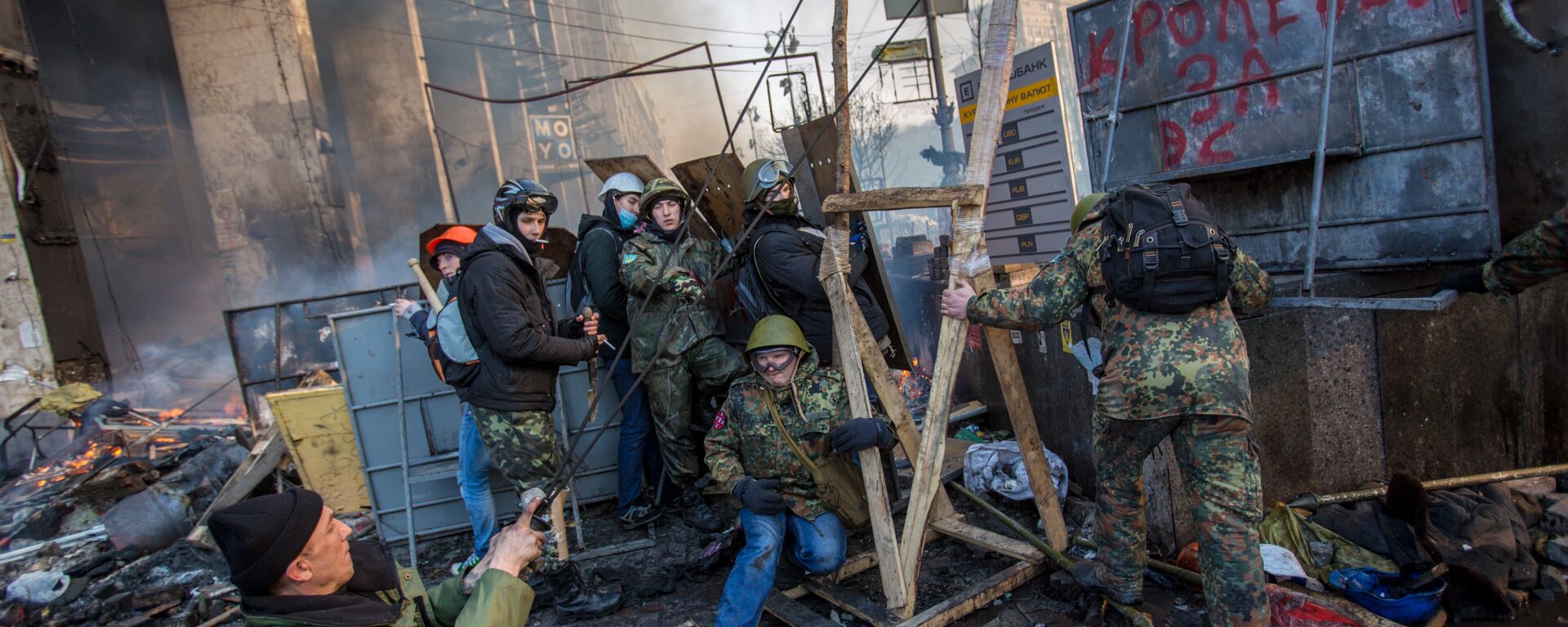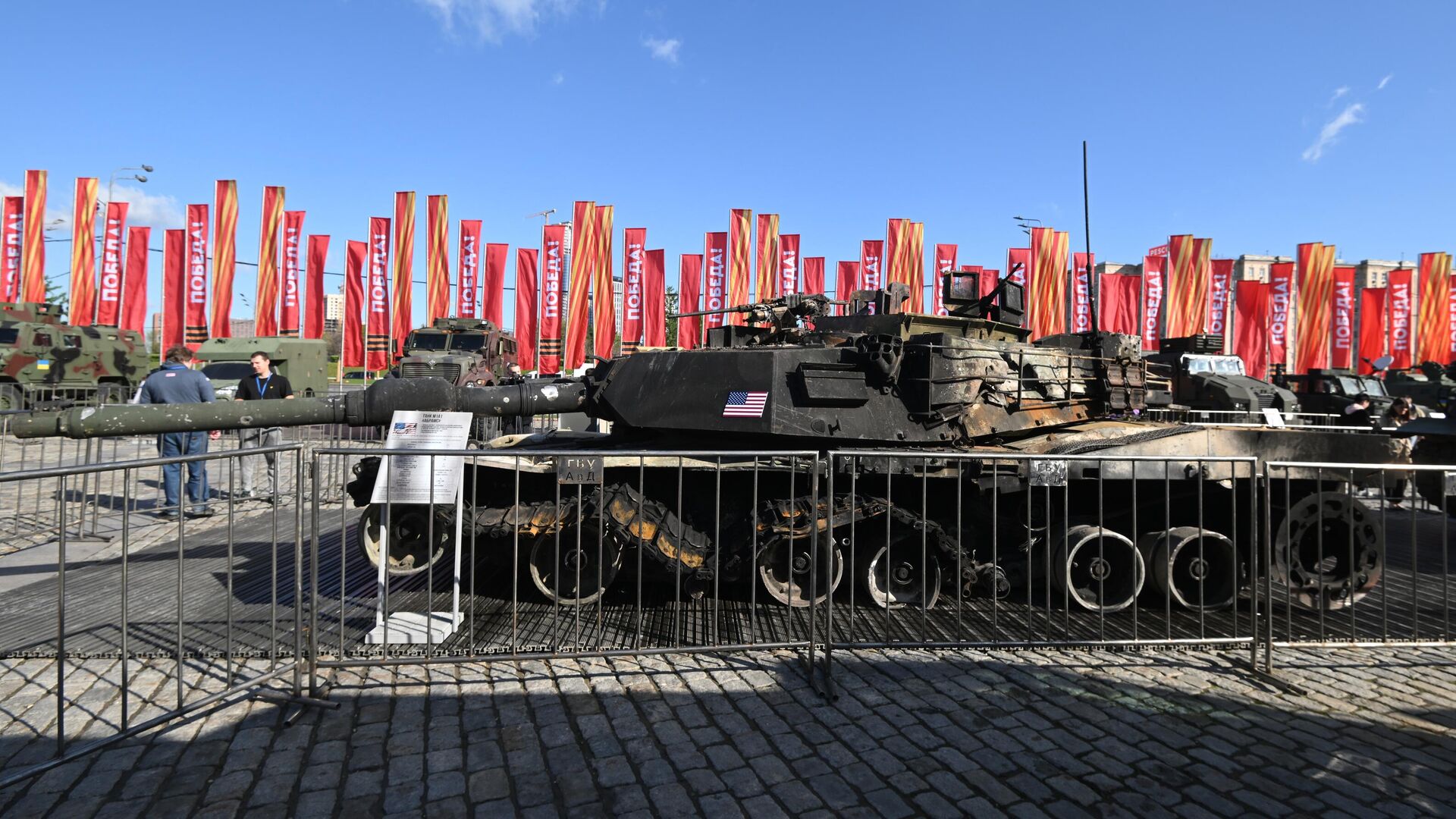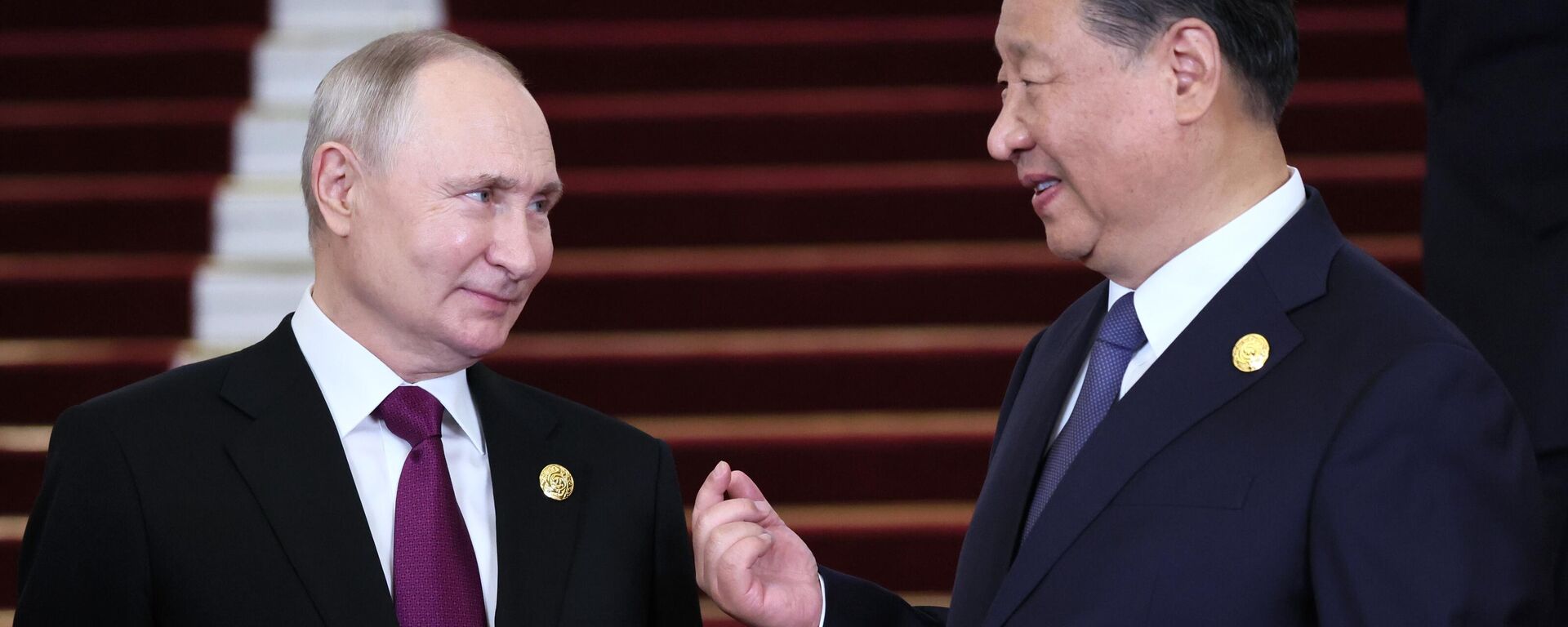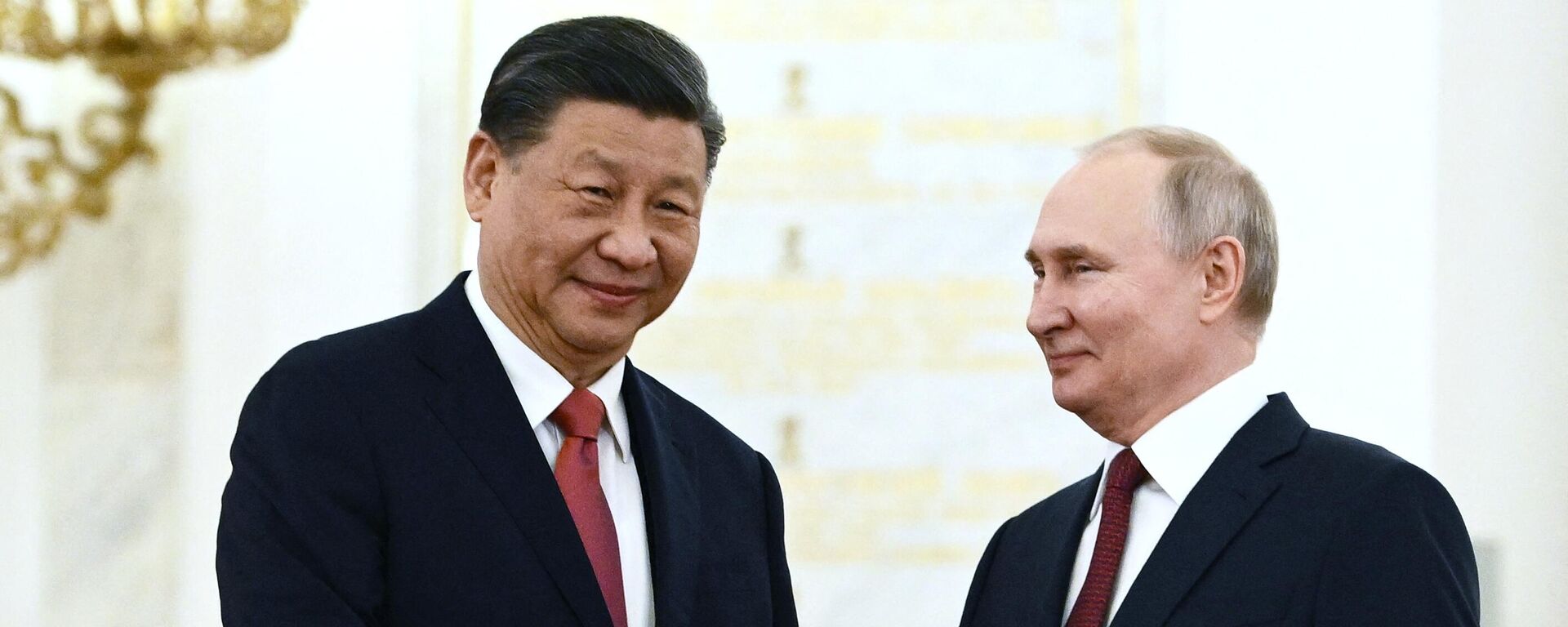https://sputnikglobe.com/20240516/endgame-for-ukraine-peaceful-settlement-still-blocked-by-anti-russia-west-1118459668.html
Endgame for Ukraine? Peaceful Settlement Still Blocked by Anti-Russia West
Endgame for Ukraine? Peaceful Settlement Still Blocked by Anti-Russia West
Sputnik International
Jim Jatras, a former senior foreign policy advisor to Republicans in the US Senate, joined Sputnik’s Political Misfits program to discuss Russian President Vladimir Putin’s meeting with his Chinese counterpart Xi Jinping, where the two will reportedly discuss the ongoing Russo-Ukrainian war.
2024-05-16T01:01+0000
2024-05-16T01:01+0000
2024-05-16T01:12+0000
analysis
volodymyr zelensky
vladimir putin
jim jatras
ukraine
russia
nato
donbass
russophobia
ukrainian conflict
https://cdn1.img.sputnikglobe.com/img/07e8/05/10/1118462492_0:264:3172:2048_1920x0_80_0_0_f7e6e5079646b3c9977fbda273864042.jpg
President Vladimir Putin arrived in China early Thursday for the Russian leader’s first foreign visit since beginning another term in office earlier this month.Recent reporting suggests discussions over the ongoing Russo-Ukrainian war will take place when Putin meets with his counterpart Chinese President Xi Jinping before touring the Asian country. China released a 12-point peace plan to end the conflict last year, identifying eastward NATO expansion as the origin of the conflict. Beijing has stressed the importance of addressing Moscow’s security concerns in any peace settlement, criticizing Western efforts that exclude Russian participation.Putin has praised “the genuine desire of our Chinese friends to help stabilize the situation,” endorsing Beijing’s view of the roots of the war.Jim Jatras, a former senior foreign policy advisor to Republicans in the US Senate, joined Sputnik’s Political Misfits program to discuss the meeting as the attempted assassination of Slovak Prime Minister Robert Fico demonstrates enduring tensions over the conflict throughout Europe.“Let's remember, too, that Xi just got back from his trip to Europe where he had a very contentious meeting with [French President Emmanuel] Macron,” noted Jatras. “The Chinese plan, remember – we're talking about many months ago when developments were very, very different from what they are now, especially now with this new [Russian] offensive coming in the north of Ukraine. It's possible that the Russians would [previously] settle for some kind of minimalist plan.”Although Zelensky’s defenders frequently cast the crisis in the Donbass as a struggle to uphold Western democratic values, the Ukrainian leader has been heavily criticized for his undemocratic policy since taking office. Zelensky has insisted elections will remain suspended while the country is at war while also banning opposition-aligned political parties. In 2021, the controversial leader banned three opposition television networks, then blacklisted eleven opposition parties in March 2022.Tensions between pro-Russian supporters of Donbass independence and pro-Western Ukrainian nationalists, neo-Nazi gangs constituted a major cause of the current political and military crisis. Polling consistently revealed that only a minority of Ukrainians supported the pro-Western protests that led to 2014’s so-called Euromaidan coup. A survey in 2019 showed only 9% of Ukrainians expressed confidence in the regime that took hold afterwards, the lowest support for any government in the world.Yet Zelensky’s Western backers continue to block a negotiated solution with Russia even as support for the Kiev regime remains low. Questions remain over how Moscow may choose to end the conflict as Russian armed forces continue to make gains in the Kharkov region.“What do the Russians intend?” asked Jatras. “What do they want to see as the endgame? Because whatever it is I think they're in the position to impose it. The question is, politically, what have they decided to do?”“These people are ideologues,” said Jatras of Ukraine’s Western backers. “They have no way of actually coming to a reasonable accommodation for Russian interests, no matter how many people in Moscow might actually welcome such a thing. So I think they're still looking at the calculus to say, ‘well, how much could we still hurt the Russians?’”
https://sputnikglobe.com/20240515/putin-goes-to-china-in-first-post-re-election-visit-agenda--expected-takeaways-1118444515.html
https://sputnikglobe.com/20240225/at-long-last-uk-media-blasts-wests-support-to-euromaidan-coup--ukraine-conflict-1116974378.html
https://sputnikglobe.com/20240515/putin-visits-beijing-as-biden-bogged-down-in-efforts-to-undermine-russia-china-1118436022.html
ukraine
russia
donbass
Sputnik International
feedback@sputniknews.com
+74956456601
MIA „Rossiya Segodnya“
2024
John Miles
https://cdn1.img.sputnikglobe.com/img/07e8/01/19/1116388787_0:0:1316:1316_100x100_80_0_0_77e70d36afd983012b1c5d38ddb84156.jpg
John Miles
https://cdn1.img.sputnikglobe.com/img/07e8/01/19/1116388787_0:0:1316:1316_100x100_80_0_0_77e70d36afd983012b1c5d38ddb84156.jpg
News
en_EN
Sputnik International
feedback@sputniknews.com
+74956456601
MIA „Rossiya Segodnya“
Sputnik International
feedback@sputniknews.com
+74956456601
MIA „Rossiya Segodnya“
John Miles
https://cdn1.img.sputnikglobe.com/img/07e8/01/19/1116388787_0:0:1316:1316_100x100_80_0_0_77e70d36afd983012b1c5d38ddb84156.jpg
putin xi meeting, putin xi ukraine, china ukraine war, china russo-ukrainian war, nato anti-russia, west anti-russia, zelensky authoritarian, zelensky anti-democratic, zelensky centralization of power
putin xi meeting, putin xi ukraine, china ukraine war, china russo-ukrainian war, nato anti-russia, west anti-russia, zelensky authoritarian, zelensky anti-democratic, zelensky centralization of power
Endgame for Ukraine? Peaceful Settlement Still Blocked by Anti-Russia West
01:01 GMT 16.05.2024 (Updated: 01:12 GMT 16.05.2024) Ukrainian President Volodymyr Zelensky’s backers are still driven by anti-Russia extremism, claims one analyst.
President Vladimir Putin arrived in China early Thursday for the Russian leader’s first foreign visit since beginning another term in office earlier this month.
Recent reporting suggests discussions over the ongoing Russo-Ukrainian war will take place when Putin meets with his counterpart Chinese President Xi Jinping before touring the Asian country. China released a
12-point peace plan to end the conflict last year, identifying eastward NATO expansion as the origin of the conflict. Beijing has stressed the importance of addressing Moscow’s security concerns in any peace settlement, criticizing Western efforts that exclude Russian participation.
Putin has
praised “the genuine desire of our Chinese friends to help stabilize the situation,” endorsing Beijing’s view of the roots of the war.
Jim Jatras, a former senior foreign policy advisor to Republicans in the US Senate, joined
Sputnik’s Political Misfits program to discuss the meeting as the attempted assassination of Slovak Prime Minister Robert Fico demonstrates enduring tensions over the conflict throughout Europe.
“Let's remember, too, that Xi just got back from his trip to Europe where he had a very contentious meeting with [French President Emmanuel] Macron,” noted Jatras. “The Chinese plan, remember – we're talking about many months ago when developments were very, very different from what they are now, especially now with this new [Russian] offensive coming in the north of Ukraine. It's possible that the Russians would [previously] settle for some kind of minimalist plan.”
“I don't think that's going to happen,” he argued. “Despite whatever their other inclinations might be, I think the Russians will be forced to go for something that's much more maximal, maybe including what amounts to the liquidation of the current Ukrainian state which, by the way, will be facilitated by the fact that as of next week [Ukrainian President Volodymyr] Zelensky won't even be the legal president of Ukraine anymore.”
Although Zelensky’s defenders frequently cast the crisis in the Donbass as a struggle to uphold Western democratic values,
the Ukrainian leader has been heavily criticized for his undemocratic policy since taking office. Zelensky has insisted elections will remain suspended while the country is at war while also banning opposition-aligned political parties. In 2021, the controversial leader banned
three opposition television networks, then blacklisted
eleven opposition parties in March 2022.
Tensions between pro-Russian supporters of Donbass independence and pro-Western Ukrainian nationalists, neo-Nazi gangs constituted a major cause of the current political and military crisis.
Polling consistently revealed that only a minority of Ukrainians supported the pro-Western protests that led to 2014’s so-called Euromaidan coup. A survey in 2019
showed only 9% of Ukrainians expressed confidence in the regime that took hold afterwards, the lowest support for any government in the world.

25 February 2024, 16:18 GMT
Yet Zelensky’s Western backers continue to block a negotiated solution with Russia even as support for the Kiev regime remains low. Questions remain over how Moscow may choose to end the conflict as Russian armed forces continue to make gains in the Kharkov region.
“What do the Russians intend?” asked Jatras. “What do they want to see as the endgame? Because whatever it is I think they're in the position to impose it. The question is, politically, what have they decided to do?”
“There is also speculation, I have seen, that even this is a diversion for what is really going to be intended as a move on Odessa,” he added. “At some point, though, I think the expectation of a lot of people is that whether it's a crack in the front in the Donbass, whether it's in the north, whether it's a move on the south, that the Ukrainian army and the Ukrainian state is on the verge of collapse, and the only thing holding it up at this point is Tony Blinken and his guitar.”
“These people are ideologues,” said Jatras of Ukraine’s Western backers. “They have no way of actually coming to a reasonable accommodation for Russian interests, no matter how many people in Moscow might actually welcome such a thing. So I think they're still looking at the calculus to say, ‘well, how much could we still hurt the Russians?’”






